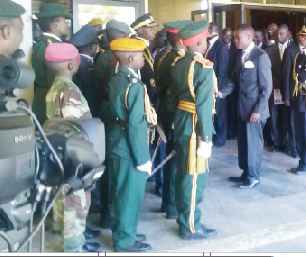
ZIMBABWE Youth Council (ZYC), custodians of Junior Parliament, has announced June 20 as the date for the new junior presidential elections to be conducted at the Harare Institute of Technology.
WINSTONE ANTONIO
ZYC communications officer Innocent Katsande told NewsDay that the elections would be held soon after orientation of the new junior parliamentarians on June 19.
“We are done with the selection of junior parliamentarians and our focus is now on the elections of the Child President after the orientation of the incoming parliamentarians,” Katsande said.
He added that the occasion would also be used to elect other office bearers including the two Vice-Presidents and the Child Speaker of Parliament.
Katsande said the junior parliamentarians elected at provincial levels would make up the electorate that will elect the President and other office bearers through a secret ballot.
It is also envisaged that the new presidium elected on the day will appoint its own Junior Cabinet soon after its election. “The presidium at its first sitting would appoint the Children’s Cabinet and the Child Ministers of State with equitable representation of provinces, gender and disability being factors considered in coming up with the Cabinet,” he said.
The Junior Parliament mirrors the National Parliament set up where the deputy speaker and Senate deputy president will retain their electoral constituencies.
- Chamisa under fire over US$120K donation
- Mavhunga puts DeMbare into Chibuku quarterfinals
- Pension funds bet on Cabora Bassa oilfields
- Councils defy govt fire tender directive
Keep Reading
Katsande said child parliamentarians were elected by popular vote. The elections are co-ordinated and monitored by an all-stakeholders’ committee chaired by ZYC.
Katsande also said they had set June 21 as the date for the official opening of the 22nd session of the Children’s Parliament of Zimbabwe.
“As we officially open the Junior Parliament, the nation will also be celebrating the belated Day of the African Child which is commemorated annually on June 16,” he said.
Katsande said President Robert Mugabe would be the Guest of Honour at the event.
This year’s Day of the African Child theme was Child friendly, quality, free and compulsory education for all children in Africa.
The Day of the African Child came into being following a declaration by the African Union Heads of State as an important day in the commemoration of the 1976 protests by schoolchildren in Soweto, South Africa.
The students protested against an education designed to further the purposes of the apartheid regime. The brutal response of the apartheid security agencies to the unarmed students’ protests resulted in the death of a number of children.
The 1976 protests contributed greatly to the eventual collapse of the apartheid regime. In 1991, the African Union Assembly passed a resolution designating June 16 as a Day for the celebration of the African child.
It is to this end that the Ministry of Youth, Indigenisation and Economic Empowerment, through the ZYC, has made a decision to use this day annually to convene the local Children’s Parliament.
The Zimbabwe Junior Parliament was established in 1991. The programme allows children to participate in the national agenda, while addressing concerns affecting children in Zimbabwe. Junior Parliament operates as a mirror or image of Parliament and every constituency in the country has a child parliamentarian representative.
The programme has also helped to provide a platform to harness and develop leadership qualities in many young people.
Each year, children from across the country’s constituencies are elected by their peers to be representatives in the Junior Parliament.
The 10 governors from each province will then compete for the presidency in an election that only junior parliamentarians participate.











